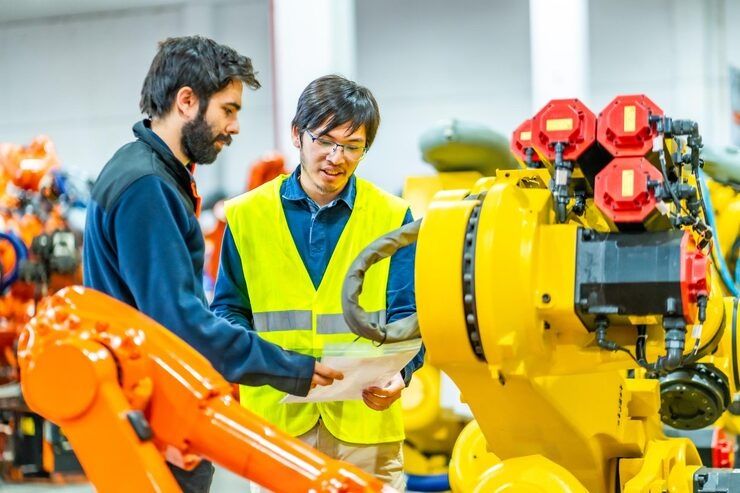Specialty industrial machinery refers to system designed for surprisingly particular packages throughout industries along with production, electronics, prescribed drugs, car, and chemical processing. Unlike wellknown-purpose equipment, distinctiveness machines are tailor-made to perform precise obligations, regularly requiring precision, customization, or automation.
The improvement of specialty equipment grew along industrialization, as producers sought gadget able to dealing with complex methods efficiently. Today, these machines combine advanced technologies together with robotics, CNC structures, and IoT connectivity to fulfill demanding operational requirements.

Importance
The importance of special industrial machines is reflected in its capacity:
Increase operating efficiency:
Reduce automation and work -specific design manual and production time.
Increase and quality:
Machines can perform very accurate operations, reduce errors and errors.
Support Innovation:
Adapted machinery enables the production of advanced products, such as microchips, medical equipment and aerospace components.
These machines are completed for complex processes:
Designed for unique workflows, optimizing production in special areas.
Make sure safety and compliance:
analog safety facilities protect operators and maintain regulatory standards.
By addressing efficiency, quality and special requirements, these machines are important for modern industrial activities.
Newer updates
In 2023-2024, recent industry development highlights innovation in special industrial machinery:
Robotics integration:
The use of robotic arms and automatic handling systems increased for accurate and repetitive functions.
Digital twins and simulation:
Virtual modeling of machines enables customization and future maintenance.
Iot and Data Analytics:
Smart Machinery collects real -time data to perform performance monitoring and improve efficiency.
Sustainable machine solutions:
Emphasis of energy-capable engines, lightweight materials and recycled components.
Global demand growth:
The adoption of special machines has increased electronics, drugs and sectors for renewable energy.
Advanced material handling:
Machines that are able to handle materials with delicate, dangerous or high temperatures have seen an increase in adoption.
These updates reflect the increasing importance of accuracy, automation and stability in industrial processes.
Laws or Policies
Specialty industrial equipment is recommended by means of the use of pointers and rules to make sure protection, best, and environmental compliance:
Occupational protection necessities:
Machinery have to have a look at close by and international protection guidelines to shield operators.
Industry-precise requirements:
Pharmaceuticals, aerospace, and food industries require system to meet ISO, GMP, or FDA requirements.
Environmental regulations:
Machines need to stick to emission, strength consumption, and waste disposal necessities.
Import/export regulations:
Many global places adjust the exchange of immoderate-precision or risky equipment.
Certification requirements:
CE marking, UL certification, and ISO certifications make certain device wonderful and criminal compliance.
Compliance guarantees that specialty machinery operates properly, correctly, and sustainably.
Tools and Resources
Several resources help organizations pick out, keep, and optimize area of expertise commercial machinery:
Simulation software:
Models workflows, predicts device performance, and tests new methods earlier than deployment.
Maintenance systems:
Track provider schedules, offer troubleshooting steerage, and assist predictive preservation.
Industry databases: Catalogs of gadget specs, manufacturers, and packages.
Iot monitoring gear:
Real-time dashboards for performance, strength utilization, and downtime tracking.
Training assets: Online guides, certification programs, and operator manuals for secure and green use.
| Machine Type | Function | Typical Applications |
|---|---|---|
| CNC Milling Machines | Precision cutting and shaping | Aerospace, automotive, medical devices |
| Robotic Assembly Units | Automated assembly of components | Electronics, automotive, appliances |
| Pharmaceutical Tablet Presses | Produces tablets with high accuracy | Pharmaceuticals |
| High-Temperature Furnaces | Heat treatment for metals and ceramics | Manufacturing, material science |
| Automated Inspection Systems | Quality control using sensors and cameras | Electronics, packaging, automotive |
FAQs
Does the specificity define the business machinery?
Especially business machinery is designed for specific, often complex programs, which require accurate, adaptation or better automation.
Which industries use Forte machines most?
Large industries include electronics, drugs, aerospace, car, chemicals and food processing.
How does the automation effect affect specificity machinery?
Automation improves accuracy, reduces human mistakes, increases performance and allows continuous operation.
Is security complicated for these machines?
Yes, especially maintenance is required regularly, including calibration, component options and software updates.
Can small outfits use specificity business machines?
Yes, modular or semi-castom machines allow small companies to be specifically adopted.
Conclusion
Specialty commercial machinery is vital to modern production, enabling specific, efficient, and revolutionary production tactics. From CNC machines to robotic meeting devices, these structures serve industries that require excessive accuracy and specialized functionality.
Recent tendencies in automation, digital monitoring, and sustainable designs exhibit the arena’s cognizance on efficiency, safety, and environmental responsibility. By leveraging right equipment, complying with guidelines, and following quality practices, agencies can optimize operations and keep competitive benefit.
As industries continue to adapt, specialty industrial equipment will continue to be a cornerstone of innovation, helping complicated production and the development of advanced technologies worldwide.